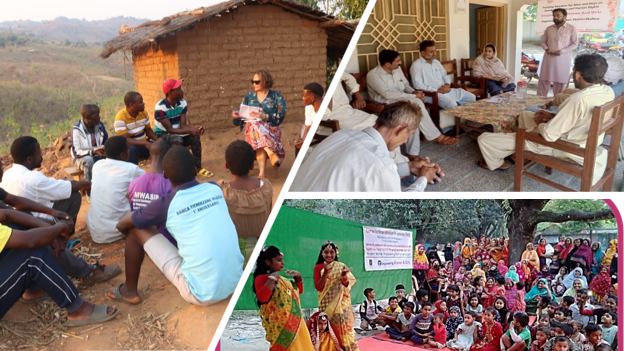
By Ms Frances J. Ferreira
Senior Adviser: Women and Girls, COL
The annual 16 Days of Activism Against Gender-Based Violence campaign begins on 25 November, the International Day to End Violence Against Women and ends on December 10, International Human Rights Day. This global campaign emphasises the urgent need to address the rising violence against women and calls for actionable commitments to break the cycle. This year’s theme is “Towards 30 years of the Beijing Declaration and Platform for Action: Unite to end violence against women.”
Nearly 30 years ago, 189 countries gathered in Beijing for the Fourth World Conference on Women and adopted the Beijing Declaration and Platform for Action. This progressive blueprint envisions a world where women and girls have equal rights and freedoms. It emphasises the need for collective efforts, including partnerships with men and boys, to achieve gender equality. Despite progress since then, we are still far from achieving gender equality and eliminating gender-based violence.
The Reality of Gender-Based Violence (GBV):
- 1 in 3 women have experienced intimate partner violence, totalling 736 million globally. (World Bank Gender data portal)
- 19 per cent of women are married before 18, making them vulnerable to lifelong GBV. (The Child marriage data portal)
- 38 per cent of women online have faced digital violence, showing how technology can be weaponised against women. (UN Women)
Addressing Gender-Based Violence
Addressing GBV requires tackling its root causes. When women lack social, economic, or political power, they become vulnerable to violence and abuse.
Ending gender-based violence is complex and ingrained in society. It requires multiple stakeholders at various levels, using diverse mechanisms and engaging different audiences, from individuals to communities. Prevention is the key, involving the empowerment of women and the engagement with men and boys.
The Commonwealth of Learning (COL’s) Empowering Women and Girls (EWG) project aims to advance education, skills development, economic participation and health to achieve sustainable social transformation. Its goal is for women and girls to assert their rights, live with dignity, and be free from gender-based discrimination.
Working with Men and Boys Clubs
The EWG project collaborates with community leaders, men and boys to raise awareness about women’s rights and gender-based violence and aims to change social norms. One approach is establishing men’s and boys’ clubs to promote gender equality and alter negative norms.
Talat, a participant, shared, “Friendships have developed among the members and many of us regularly meet at my workplace or in the village. We often discuss women’s empowerment and share our experiences.”
He noted that a weak economy contributes to domestic violence, with three cases observed in their community. The peer support group provides a safe space for men to discuss challenges and share experiences, fostering positive change.
In another visit, a community leader in Malawi revealed he was unaware of gender-based violence until the EWG project’s awareness efforts. Engaging men and boys in communities helps address GBV and shift social norms around women’s rights.
Elimination of GBV in Schools
Gender-based violence in and around schools is a major reason for girls dropping out, with an estimated 60 million girls experiencing sexual assault on their way to or from school each year (United Nation’s Girls Education Initiative). Therefore, educating school management and teachers on gender equality and GBV prevention is crucial.
Empowering girls from a young age is essential, nurturing their inner strengths, developing leadership skills, and giving them opportunities to use their voices. In Pakistan, girls from the EWG project met with the Chief Minister of Punjab Province to request better safety in schools. As a result, the Chief Minister directed the establishment of harassment committees in every school in the Province to ensure student safety.
Creating Opportunities for Women Affected by GBV
The EWG project supports women and girls through education, training, and livelihood connections. Many participants, including survivors of gender-based violence, are now on a path to a brighter future.
In Malawi, Ndapilira received vocational training in trades like laundry soap-making from a local partner, Concerned Youth Organization. She shared her story of abuse and how she divorced her abusive husband. After training, Ndapilira and seven other women started a soap-making business where they share profits weekly to support their households.
Today, Ndapilira’s future looks bright. She proudly detailed her accomplishments, “I finalised payment for a piece of land and bought iron sheets for the house I intend to build on that plot and use the solar-powered electricity system that I bought with profits from soap sales for my current home ’.
Let’s Unite to End GBV
As we observe the 16 Days of Activism Against Gender-Based Violence, stories like Talat’s and Ndapilira’s show how holistic efforts can disrupt this cycle. Ending GBV requires shared responsibility and united effort. Empowering women and girls and engaging men and boys as allies contributes to a safer and more equitable world.
Over these 16 days, let’s unite to advocate for impactful actions on the ground and influence policymakers, working towards the vision set forth in the Beijing Declaration.


